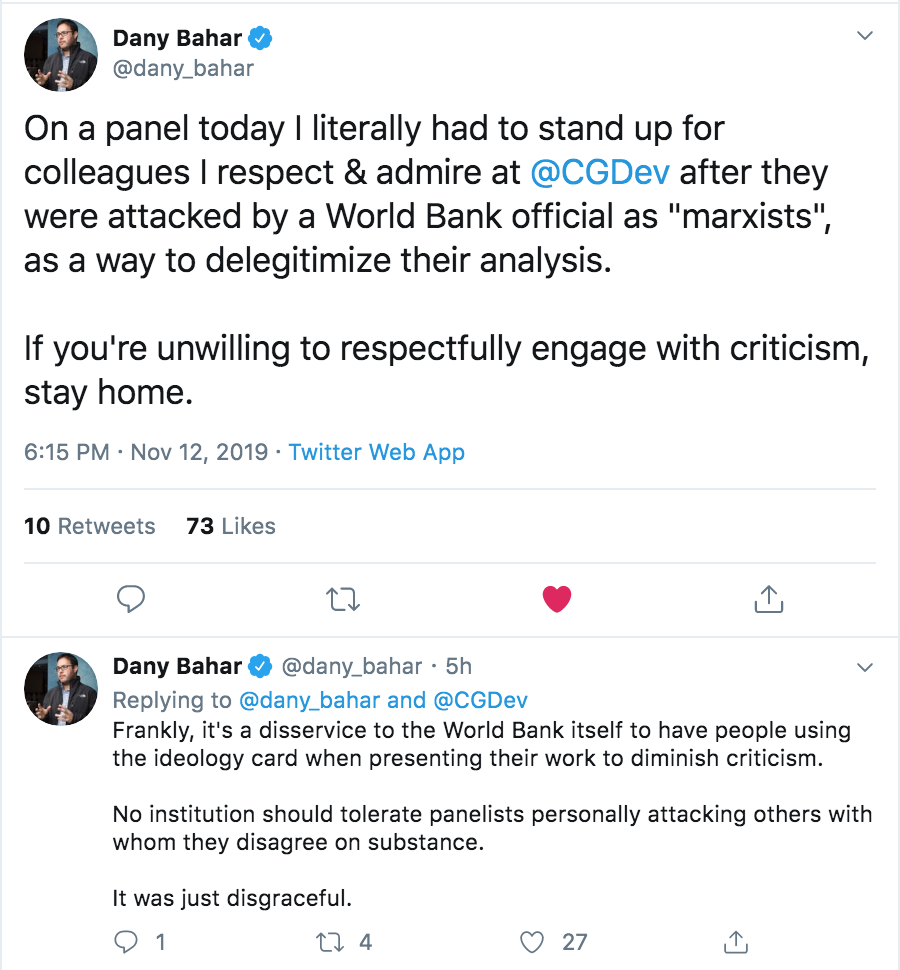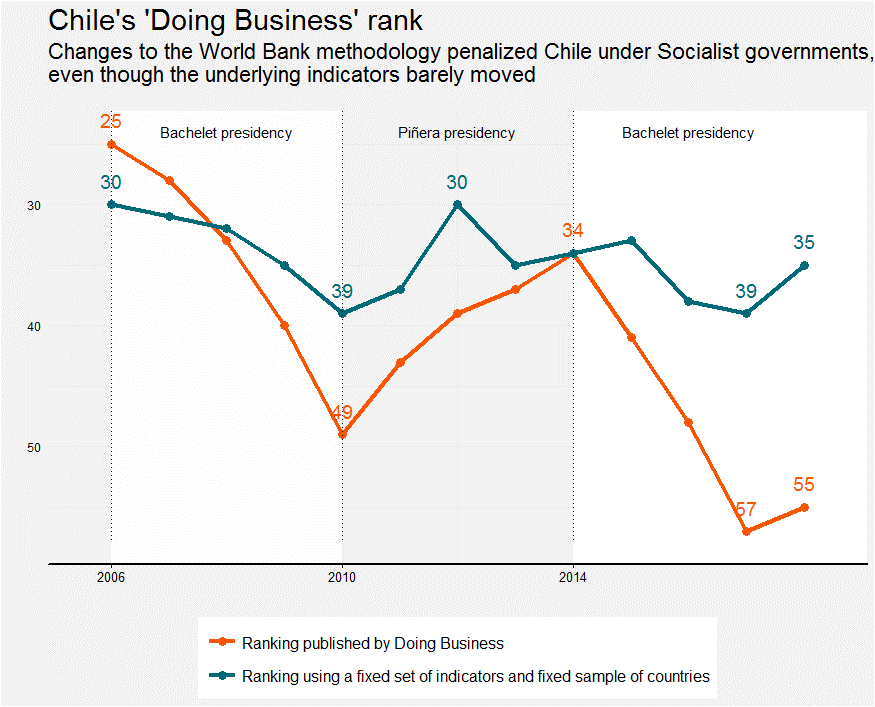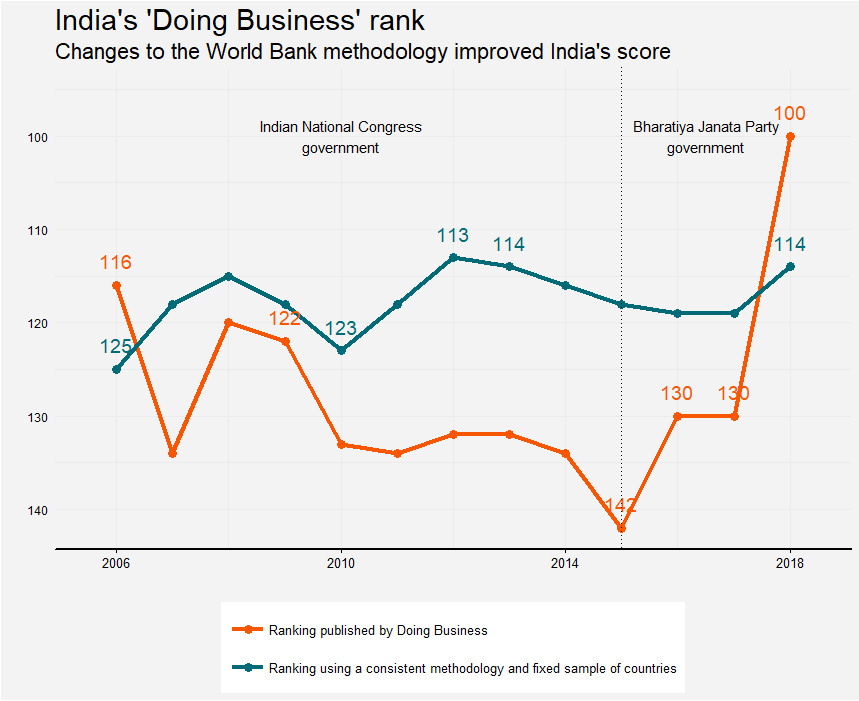As I walked home last night, Dany Bahar of the Brookings Institution sent me this short Twitter thread.
I could guess what this was about.
The comments Dany describes (and I’m very grateful for his defense) came from Simeon Djankov, founder of the World Bank’s Doing Business Index, which measures the costs of business regulations and taxes around the world. Djankov’s extended assault came during a panel on Tuesday at the American Enterprise Institute. You can watch the full video online.
The exciting part starts at around minute 54, when AEI’s Jim Pethokoukis reads aloud an excerpt from a piece I wrote for CGD last year with my colleague Divyanshi Wadhwa, shortly after Nobel Laureate, and then-Chief Economist of the World Bank, Paul Romer told the Wall Street Journal that he had lost faith in the “integrity” of Doing Business. We wrote:
“…the index measures the costs of government regulation but none of the benefits of those regulations. It’s an extreme libertarian stance, out of step with much of the World Bank’s other work. Viewed through the lens of Doing Business, corporate taxes are a pure bad, with no consideration of the benefits that come from raising tax revenue. Safety regulations and minimum wages are pure bads because they slow down business, with no consideration of the benefits to workers or customers. On almost all dimensions, a Hobbesian state of nature would get the best possible Doing Business score.”
Not missing a beat, Djankov responded, “This is from Das Kapital of Karl Marx, or somebody else?”
“The Center for Global Development,” Pethokoukis replied.
“It’s the same, basically, so yes, it’s the same. So Marxists,” Djankov said.
He wasn’t done:
“CGD you mentioned. Reformed Marxists. My answer to them is great, so why don’t you create your own index. So we have this index, it’s called “The Cost of Doing Business.” It’s not called the cost of running a society. It’s not called the benefits of running a society. It’s called ’The cost of Doing Business.’ So is it truth in advertising? It is. So CGD should create an index that says the benefits of doing business, or the benefits of regulation. They should have a great index. It should be as famous as our index. And then that index plus our index would actually be the truth. But they can’t. They don’t really have the… anyhow, they don’t have many things. They cannot create.”
While Djankov railed against our criticism of Doing Business’s ideological slant, he failed to respond whatsoever to the data-based, methodological points we raised about the Doing Business index.
In our piece last year, we had analyzed the Doing Business data to try to corroborate Paul Romer’s claim that revisions to the Doing Business methodology had artificially pushed Chile down the rankings under Michelle Bachelet’s left-leaning government and back up during Sebastián Piñera’s right-leaning government. We concluded that Romer had most likely been “speculating while on the phone with a reporter, and never had any direct evidence of political interference.” But the patterns were real, and we posted code to show it. We found that if you removed the repeated methodological changes, the pattern disappeared.
Similarly in India, where Narenda Modi used India’s surge in the Doing Business rankings as a political talking point, we showed that methodological changes, not reform, had pushed India up the rankings.
These methodological concerns stand, unanswered.
Pethokoukis then brought the conversation back to our suggestion that taxation might be useful sometimes. But for the developing world, Djankov was having none of it.
“…in Mozambique, in Pakistan, in the vast variety of countries around the world, is it true that if they manage to raise more taxes, they would actually without any corruption and with great efficiency invest? No! They’re going to steal this money.
“…so then the question is, do you want the tax level and the regulation that constrains businesses—and let’s assume that you collect the money, and basically just waste it completely—or is it actually better to have a level of regulation that fits the institutional development of this country? And that’s where the committed or uncommitted Marxist cannot answer.”
It would be interesting to hear if the World Bank Country Directors for Mozambique and Pakistan hold the same view as the World Bank’s Director of Development Economics. Personally, I believe the World Bank owes its clients more balanced advice on tax policy. Indeed, the Bank is currently helping Pakistan raise more tax revenue, highlighting what an aberration Doing Business is, even within the Bank.
AEI’s Stan Veuger noted during the panel that he had invited some people from CGD to participate, but sadly we couldn’t make it. I was one of those people. I told Veuger that, per CGD tradition, I couldn’t come if it was going to be an all-male panel. Veuger noted that AEI had invited multiple women, but all declined.
As for whether CGD is Marxist: Technically we don’t take institutional positions. But whatever the ideological leanings of CGD staff, when confronted with data and code questioning our analysis, I hope we can do better than name-calling.
Disclaimer
CGD blog posts reflect the views of the authors, drawing on prior research and experience in their areas of expertise. CGD is a nonpartisan, independent organization and does not take institutional positions.








